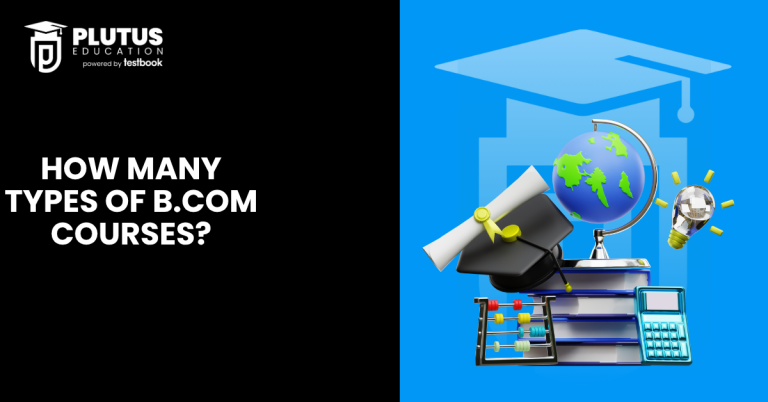The types of BCom courses available today cater to the needs of diverse students. The courses have their fundamental knowledge in commerce and specialization/integration with higher-level professional certifications. Most students are curious to know how many types of BCom courses exist. The concept is derived from understanding the variations available under general and honors programs and integrated degrees. All kinds of courses are designed to suit the specific career goals students wish to pursue. This is one of the most diversified undergraduate courses- BCom.
How Many Types of B Com Courses?
The basic segregation of b com courses can be done as B com general and B com Honours, and under that, we can further classify the courses based on different specializations offered by b com courses.
BCom General
BCom General is a generalist course that gives students a broad foundation in most commerce-related subjects. It also covers some major fields like financial accounting, business laws, principles of management, and marketing. BCom General is different from specialized programs in which students cannot study several subjects together, thus enabling them to choose careers from a broader range. Students seeking entry-level positions in accounting, banking, or business operations will find the perfect combination of knowledge and hands-on skills in this course.
BCom Honors (BCom Hons)
The specialized undergraduate course is BCom Honors. The area of study goes further into the fields of commerce. Students can major in finance, taxation, economics, and marketing, which better prepares them to take on advanced roles and qualifications. For instance, the BCom Honors in Accounting and Finance guarantees technical skills for a career in investment banking, auditing, and corporate finance. The course is challenging and prepares students for competitive exams like CA, CFA, or CMA. This, in turn, hands it a clear edge over general BCom courses.
Top Specializations in BCom Course
Specializations further add to the diversity of the types of courses BCom.courses dating a particular specialization; students can enrol in a program that suits the needs of their future profession; each specialization further deep dives into specific domains, so the knowledge acquired turns out to be industry-specific.

For example:-
- BCom in Accounting and Finance, complex accounting practices with cost management and financial analysis are dealt with. One should have these for working in financial advisory and audit firms. In a similar way,
- BCom in Marketing hones the skills of consumer behavior and advertising, which are essentials for careers in sales, branding, and public relations. Therefore, by selecting the right specialization, expertise will be available to the students, giving them an advantage over others in the market.
BCom vs. BCom Honors
The choice between BCom General and BCom Honors depends on a student’s career goals and interests in the specialization. BCom General is an overview of commerce suitable for students who are still exploring their options or seeking entry-level jobs. In contrast, BCom Honors requires a focused approach and provides a deeper understanding of specific subjects such as accounting, taxation, or economics. It focuses on those students who are clear in their minds what their careers will be and would love to specialize and gather higher-level information about the selected domain.
For example, finance-focused honours BCom may specialize in world financial markets or strategies of investing for general stream BCom, which is the economic concept used across most industrial fields. This also typically demands challenging courses and projects for leaders and professionals with degrees like ACCA and CFA.
Integrate BCom Course
The integrated BCom course combines undergraduate degrees with professional qualification programs or post-graduate degrees, offering students twin advantages. Students looking to add international certifications after completing undergrad and needing higher management and marketing designations get direct entry.
For instance, a BCom with CA helps in aligning study with the CA syllabus thereby saving preparation time of CA exams. Similarly, ACCA with BCom would prepare students to work internationally within accounting and finance, based on worldwide financial standards including IFRS. Time-saving, bright career prospects, and a powerful foundation for professional success are added benefits of integrated programs.
1. BCom with CA (Chartered Accountancy)
B Com with CA is one of the most followed combinations of courses by students in the commerce area. In such a program, the undergraduate program is actually framed to include preparation for the CA exams. This way, the student gets his degree as he studies for a Chartered Accountant. The emphases are on areas of accounting standards, financial reporting, and corporate laws. This provides them with an structured approach in preparation towards becoming a Chartered Accountant, thus integrating any hands-on knowledge inducted into one’s studies.
2. B Com with ACCA (Association of Chartered Certified Accountants)
This is recommended to students who, as a profession, will seek work in international accounting and finance. The course is integrated in such a manner that the curriculum for BCom runs in parallel with the ACCA syllabus for certification; this covers all aspects of international accounting and financial reporting and global taxation. When graduating, most of the ACCA exam papers are sat, thus saving much time to earn this prestigious qualification.
3. BCom with LLB
BCom with LLB is an integrated five-year course providing students with vast business domain expertise. This is entirely appropriate for those youngsters who want to be corporate lawyers or compliance officers or legal advisors. Business law, company law, taxation, and contract law are some of the subjects covered under this course. It is a dynamic post that can be offered at the interface of commerce and legal affairs.
4. BCom with CMA (Certified Management Accountant)
This type of combination is suited for those who intend to work to their optimum or beyond within the management accounting world. It combines BCom subjects with a syllabus for CMA, especially on financial strategy, management decisions, and cost controls; thus, a student at the end of this program is equipped to play leadership roles within the corporate finance or strategic planning of corporations.
5. BCom with CFA
This program is primarily for students who wish to pursue investment management and finance analysis careers. It aligns the BCom curriculum with CFA Level 1, which essentially contains core aspects of portfolio management, equity analysis, and financial modelling. Such a program perfectly fits the career startups looking to begin within investment banking, asset management, or hedge funds companies.
6. BCom with CS, Company Secretaryship
BCom with CS course is designed to get a student in direct contact with corporate governance and compliance. The curriculum focuses on corporate laws, secretarial practices, and regulatory compliance and combines the BCom syllabus with the CS curriculum. Graduates from this course become company secretaries or legal advisors in an organization.
7. BCom with MCom
BCom with MCom is an integrated course through which the student can take postgraduate studies directly after successfully completing a four-year undergraduate course. This is the most suitable for those requiring advanced knowledge in commerce and those geared towards academia or research careers. Often, the specializations can be chosen in topics like finance, marketing, or international business.
8. BCom with MBA
BCom with MBA is an integrated program that trains students to give undergraduate commerce education and advanced business management skills. It makes sure the students master both the technical knowledge about commerce and leadership skills. An MBA component offers strategic management, organisational behaviour, and operations. Students are most employable at an industry level as graduates.
B.Com Distance Learning Courses
B.Com distance learning courses provide the scope of completion of the degree among those students who want to do a Bachelor in Commerce but cannot do it through regular college due to specific work, financial constraints, etc. In distance learning courses, students are given flexibility, such as studying the material at whatever time they can manage without gaining knowledge of commerce and its related field. Key Features
- Flexibility: The timing of studies is available to students, who can study whenever they want.
- Affordability: distance learning is cheaper than the usual B.Com course.
- Online Resources: The university provides materials for the study along with recorded lectures and virtual sessions on the online portal.
- Recognition: Most distance learning B.Com degrees are accepted by the University Grants Commission(U.G.C.). So, it is valid for Employment as well as higher education.
Bcom Eligibility Criteria
- Their 12th (or equivalent) must be completed with commerce or any other stream.
- For some Institutes, a minimum percentage is required to seek admission.
List of the Best Colleges which offer Distance Education in B.Com Course
- Indira Gandhi National Open University (IGNOU)
- Annamalai University
- University of Mumbai (IDOL)
- School of Open Learning by Delhi University
- Sikkim Manipal University
Career Opportunities After B.Com
B.Com is a versatile qualification that opens the door to numerous career opportunities in commerce, finance, accounting, and management. The base qualification helps students build their careers into specialized roles or further studies.
Emerging Career Areas
- E-Commerce: E-commerce Operations and digital marketing opportunities for Amazon, Flipkart, etc.
- Analytics: Financial data analyst or Business Intelligence Specialist
- Entrepreneurial Venturing: Entrepreneurship ventures in retail, finance, or technology are also a viable career option.
- Chartered Accountant (CA): Students can pursue a CA to specialize in accounting, auditing, and taxation.
- Company Secretary (CS): This career involves corporate compliance and legal responsibilities.
- Financial Analyst: B.Com holders can analyze the economic data and provide investment advice.
- Banking Sector: A B.Com graduate can work as a probationary officer, clerk, or financial advisor level.
- Accounting and Taxation: B.Com graduates can handle taxation, bookkeeping, and preparing financial reports.
- Marketing and Sales: After B.com, most of the candidates go for selling, digital marketing, and even market research
Other Post Graduate programs
- MBA (Master of Business Administration): For prospective managers
- M. Com (Master of Commerce): Advanced commerce-related subjects and research-oriented
- Certified Management Accountant (CMA): Global Recognition in Financial management and accounting.
- CPA Certified Public Accountant: International accounts
How to Select the Best B.Com Course?
What to look for while choosing a B.Com Course is a question most students have when choosing their courses. So, here are a few tips that will guide you to make the right choice:-
Career Ambitions
Select according to your long-term career ambitions. For instance, a B.Com (Accounting and Finance) would be the best fit for potential accountants, and a B.Com (Management Studies) would be the best fit for future managers. Specialization: Decide upon the area of your interest, such as taxation, marketing, or financial markets, and then select the course.
Reputation of the university
Choose a good college or university with faculty, infrastructure, and placement records.
Course mode: Decide whether it is a regular, distance learning, or an online program based on the schedule and requirements of the individual.
Eligibility and fees
one needs to see that the course offers affordable fee structures along with proper eligibility criteria that would satisfy one’s qualifications.
How to choose the best course?
B.com course with specialization. Compare curriculums and prospects of careers of different classes. Consult academic advisors or professionals in your desired field. Review the alum feedback and placement records of those shortlisted institutes. Make an informed decision based on your research and goals.
Types of B com Courses FAQs
What are the kinds of BCom courses?
The BCom course includes General, Honors and integrated programs like BCom with CA, ACCA, LLB, CFA, CMA and others.
What is BCom General as compared to BCom Honours?
BCom General is a broad commerce education compared to a specialized in-depth stream of BCom Honors in finance or accounting.
What is the integrated BCom that would help build a global career?
BCom with ACCA or BCom with CFA are good integrated programs for international accounting and finance careers.
Can I do a professional certification with my BCom degree?
Yes, you can pursue professional certifications along with your BCom degree through integrated programs such as BCom with CA, CMA, or CS.
What is the duration of BCom integrated programs?
The integrated programs typically take 4-5 years, depending on the combination, whereas a standard BCom degree will take 3 years.


